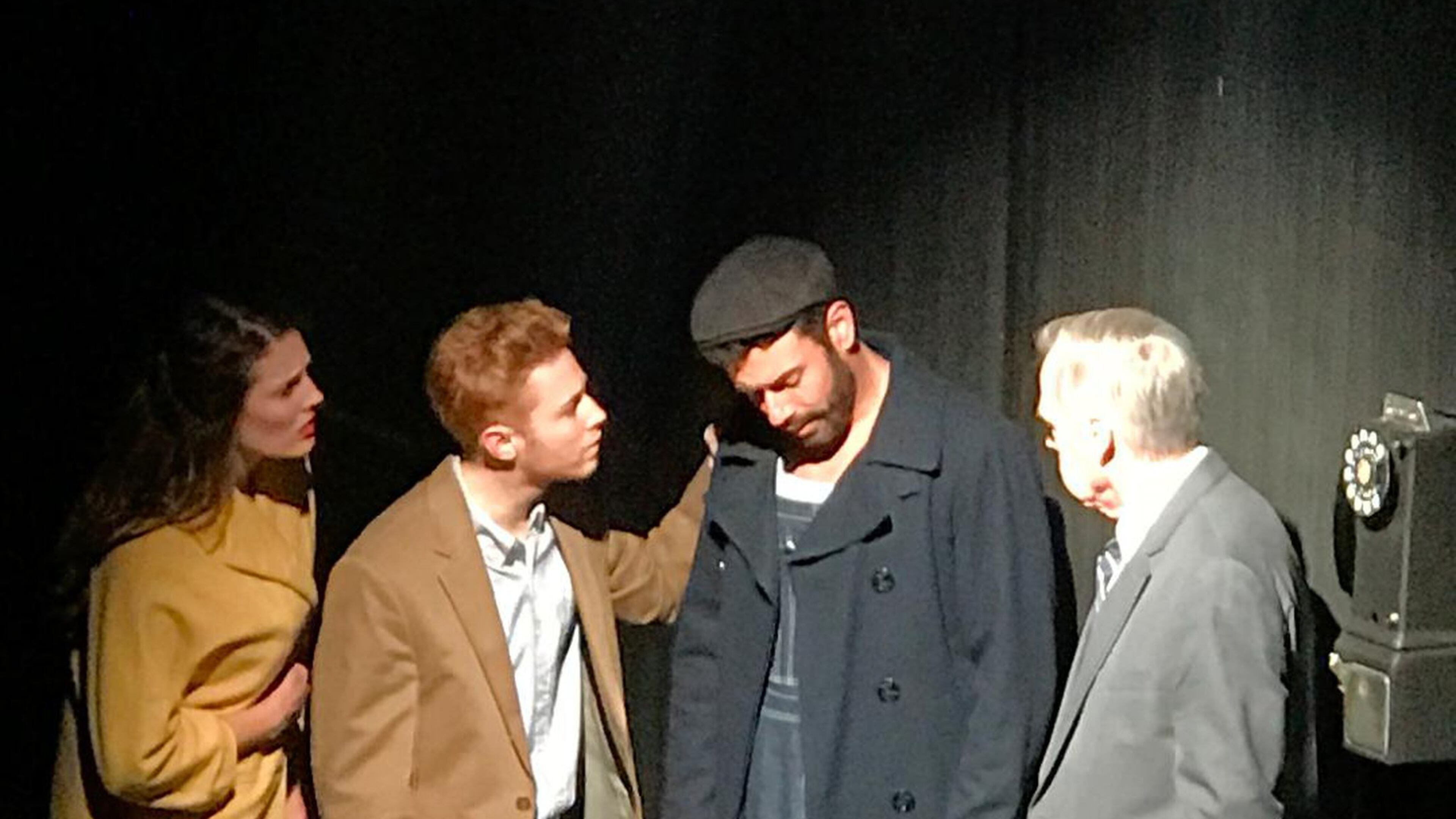Theatre in the Square’s spare take on an Arthur Miller classic

Arthur Miller’s 1955 play “A View From the Bridge” is a monumental classic, widely considered to be among the most significant and influential works in American theater. But as with many monumental classics widely considered to be among the most significant and influential works in American theater, you will rarely get the chance to see it on stage in Atlanta.
Fortunately, Marietta’s New Theatre in the Square is offering a bare-boned but reasonably sturdy and heartfelt community theater production staged by Atlanta director Prodan Dimov. The set is simple. The lighting design more or less creates two distinct moods: on or off. Costumes look like what people already had on hand in the back of their closets. Performances are decent, but not at the level of polish that theater-going audiences are accustomed to getting at big venues like the Alliance.
But much to the company’s credit, the show still moves along at an admirable pace, The production fills a hole in the current line-up of choices around town, and ultimately, in spite of the apparent surface deficiencies, it’s easy to get swept up in the fine story.
In the play, recent Sicilian immigrants Marco (Michael Maglio) and Rodolpho (Kevin Lombard) arrive in the Brooklyn home of American relatives Eddie (Kyle Crew), his wife Beatrice (Alli Noto) and his attractive young niece Catherine (Gabrielle Stephenson). The charming Rodolpho falls for Catherine, which angers the rough longshoreman Eddie, who clearly harbors an illicit desire for his niece. In order to pull the two apart, Eddie naively consults a lawyer Alfieri (Steve Pryor), who also serves as narrator of the story, but Eddie’s plans ultimately result in his own demise.

The play includes many memorable scenes, but especially well done here is the forced kiss which Eddie gives to Rodolpho in an effort to humiliate, disempower and emasculate him. The three lead actors on stage — Lombard, Crew and Stephenson — effectively navigate the scene in all of its violence and sudden, strange implications. In most new plays nowadays, you can easily guess where things are going ten minutes into the show, but this turn was in Miller’s time, and it remains, a shocking curveball. It was pretty clear the gasping audience agreed.
The play is considered a great classic, but how great is great? How classic is classic? Critics often compare “A View from the Bridge” to Tennessee Williams’ “A Streetcar Named Desire,” and it’s an interesting avenue to explore when evaluating the play. They were both written in the same era, and they are both often placed among the best plays of the 20th century, if not considered the best. But I think Miller comes up looking a little short when the two stand side by side.
“Streetcar” premiered in 1947, and since it was a huge cultural milestone, Miller undoubtedly had felt its impact: the issues, themes, characters and strategies were a huge influence on him because, at the time, they were a huge influence on everyone, even on people who didn’t write plays.
The brutal, virile, working class Eddie bears a close resemblance to the brutal, virile, working class Stanley Kowalski. Sensitive, graceful, romantically and artistically inclined Rodolfo has a less exact parallel in the sensitive, delicate, romantically and artistically inclined Blanche, but a parallel is nonetheless present. And the central drama is the same: a visiting interloper arrives from out of town and interrupts the psychosexual dynamics of a working class American home to explosive, tragic results.
Miller beautifully paints the environment of the Brooklyn docks, just as Williams beautifully paints New Orleans. Both plays are remarkable for the success with which they create a living, breathing world just beyond what we’re watching on stage. “View” feels more sober, serious and important — it’s narrated by a lawyer, after all — but I would argue that “View” doesn’t come close to the ambition and impact of “Streetcar.”
In his play, Williams said he aimed to depict not just two people in conflict, but two opposing human drives, two incompatible cosmic energies. “View” is an ambitious play, but seldom along those metaphysical lines. The outrageous, poetical reach of “Streetcar” is lacking.
And the final tragedy of “View’ is different, and lesser. Stanley pretty thoroughly defeats Blanche in the ten or so rounds we witness. We receive the news about the outcome of that fight as a report about the world: the two energies collided and exploded, with one diminished, the other propagating.
Conversely, things end badly for the brutal but complicated heterosexual white American male in “View.” It’s an end that seems predestined in the old Greek way, almost self-devised, the king dying through his tragic flaw. This is very sad, of course, and even prescient, but some viewers will leave justifiably feeling that something was missing. His story was told well, but there’s a vast sea of other American tragedies which can’t easily be viewed from that particular bridge.
THEATER REVIEW
“A View From the Bridge”
Through May 26. 7:30 p.m. Thursdays-Saturdays. 2:30 p.m. Sundays. $20-$30. Marietta's New Theatre in the Square, 11 Whitlock Ave., Marietta. 770-426-4800, www.theatreinthesquare.net.
BOTTOM LINE: A sparse but decent community theater production of a famous classic.

